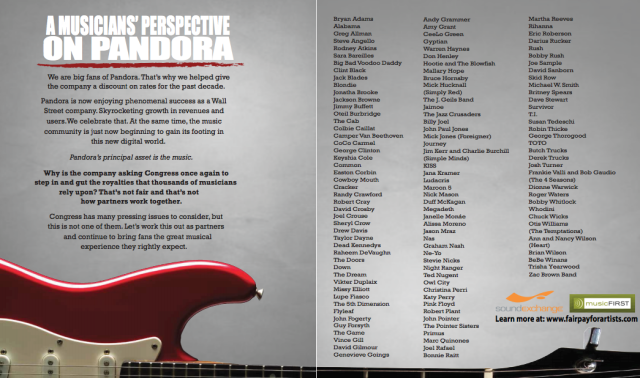
More than 100 prominent musicians have signed an open letter attacking the Internet Radio Fairness Act. The legislation would change the process used to set royalties for online music streaming services, making it comparable to the process used to set rates for satellite music services.
"Pandora's principal asset is the music," reads the full-page ad in Billboard magazine. It's signed by Rihanna, Billy Joel, Katy Perry, Pink Floyd, Ludacris, and dozens of other performers. "Why is the company asking Congress once again to step in and gut the royalties that thousands of musicians rely upon?"

The answer, supporters say, is that the current regime discriminates harshly against online streaming services. Terrestrial radio broadcasters pay no royalties at all to recording artists. Satellite music services turn over about 10 percent of their revenues to copyright holders, while Internet broadcasters like Pandora are forced to pay about half their revenue in licensing fees. The company wants to change copyright rules so that the same rules—and, presumably similar rates—apply to both online and satellite broadcasters.
In a recent interview with The Hill magazine, Pandora founder Tim Westergren pointed out these high royalty rates have forced most online streaming services out of business. AOL, Yahoo, and Microsoft have all been forced to shutter music streaming services. And while Pandora has managed to survive so far, it says its high royalty rates call into question whether it will ever achieve durable profitability.
"It's kind of a Jekyll-and-Hyde business," Westergren told The Hill. "On the growth side, it's been a wonderful story. Profitability is a different story for us. We're really struggling to make that happen."
Dueling reforms
The Pandora-backed proposal is sponsored by Sen. Ron Wyden (D-OR), one of Congress's most consistent foes of the recording industry on copyright issues. It also enjoys support from public interest groups such as the Electronic Frontier Foundation and Public Knowledge.
Wyden's proposal would not directly change the royalty rates on Internet streaming. Those are set every five years by a special three-judge panel. EFF's Mitch Stolz writes that "for satellite and cable radio, the judges set prices to give the labels and artists a 'fair return' and the music service a 'fair income.'" In practice, that has meant satellite music services are required to pay copyright holders about 10 percent of their revenues.
In contrast, for online music streaming, "the judges are supposed to set rates based on what a 'willing buyer and a willing seller' would do in an open market." The problem is that, thanks in part to this judge-driven process for setting royalty rates, there isn't a competitive market for online streaming rights. So, Stolz says, "judges have set Internet radio royalty rates at cripplingly high levels," forcing Congress to periodically step in to save webcasters from financial ruin.
Wyden, supported by Pandora and other online broadcasters, wants the rules changed so that online streaming rates are set using the same legal standards used for satellite broadcasting. They argue this will allow the creation of a healthy, sustainable online music business.
The recording industry would like to see "reform" in the opposite direction—dramatically raising the rates that would be paid by satellite and terrestrial radio. Legislation sponsored by Rep. Jerrold Nadler (D-NY) would equalize royalty rules, but it would do so by extending the "willing buyer and a willing seller" standard that currently only applies online to the satellite and terrestrial radio markets. Satellite broadcasters would pay rates at the much higher Internet level, and it would force terrestrial radio stations, for the first time, to start paying royalties to recording artists.
Unsurprisingly, the National Association of Broadcasters is strongly opposed.
reader comments
155